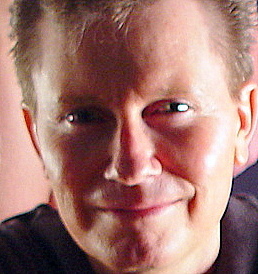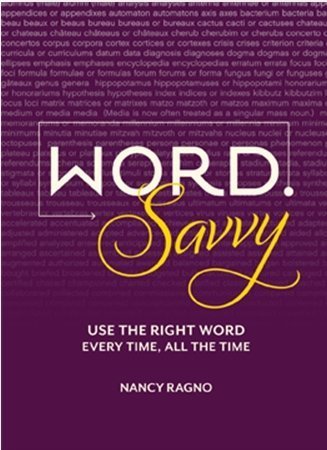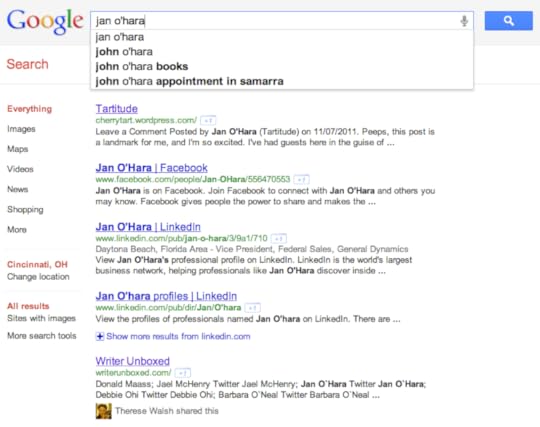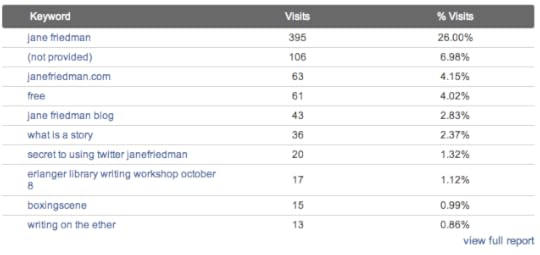Jane Friedman's Blog: Jane Friedman, page 200
November 18, 2011
Twitter: One Size Does Not Fit All
Last month, I was a speaker at PodCamp Cincinnati, where I presented two sessions. Above you can view the slidepack from one of my sessions, "Twitter: One Size Does Not Fit All." (If you don't see the slides, then click here.)
If you'd like to hear the full audio of my presentation, you can get that too! Click here or use widget below. Be aware this is completely unedited audio.
November 17, 2011
Writing on the Ether

Grigory Karpovich Mikhailov's "Prometheus," 1839 / Hellenica
Prometheus unboxed
Actually, he had pants on when he brought Fire to my door. Those brown shorts the UPS guys wear. And while Amazon started shipping the new Kindle tablet a day earlier than planned, critics flew in to start pecking out the Bezosian liver.
"CNET complained that it was too slow," Diana Dilworth told us in eBookNewser's review roundup. "It isn't a perfect experience," Dilworth quoted Endgadget's review, "but if nothing else, it's a promising look into the future of retail commerce." (Tim Stevens, smart guy.)
PC World, Dilworth wrote, said "the Fire may not meet your expectations if you're looking for an Apple iPad-like tablet." Uh-huh. USA Today, she reported, "gave the Fire the advantage only by a nose" over the Nook.
Me, I like it. Why? Two words: back light. I appreciate E Ink, but I like mine glowing in the dark. I've been yelling at Seattle's Mt. Olympus about back light ever since I got my Kindle Alpha. Boy, did I learn to love those clip-on Mighty Brights. But now I have glowy, brightness-adjustable luminosity. I could roast a chestnut on this open Fire. Also, films to distract me from reading what I'm supposed to read. And cloudly music. I mean really.
I'm giving the Kindle Fire the #PorterEndorsed seal of approval. I've unchained the UPS man and I'm feeding my lunch leftovers to the buzzards so he can get away in that big brown truck.
#bbpBox_136834462955732992 a { text-decoration:none; color:#0084B4; }#bbpBox_136834462955732992 a:hover { text-decoration:underline; }Got my Fire! Early review: too heavy, too shiny, bezel too big, but right size, responsive, and super fast. Thumbs up.[image error]about 23 hours ago via HootSuite Reply Retweet Favorite Ania Wieckowski
As a device not much larger than my original Kindle (though almost 5 ounces heavier), reading on the device is a joy. The pages look great, and accessing any of Kindle reader's smarter features such as highlighting and definitions is easy. While I love my Kindle ereader, it's definitely much easier to simply touch what I want to access — I do not miss the physical joystick from my e-ink reader.
Lance Ulanoff's extensive and balanced story for Mashable wisely doesn't forget to mention reading specifically. Can you say "content delivery system?" Amazon Kindle Fire, iPad's First True Competitor
Ulanoff manages to avoid flipping into Apple hysteria (because a $200 device isn't, after all, meant to rival a $500 device). And Steven Levy of WIRED gives us a chance to learn why Jeff Bezos Owns the Web in More Ways Than You Think. At times in this interview, it's almost natural to expect another Jobs. But when you put aside i-things and let Bezos talk his own talk, you hear a distinctive managerial style at work, shepherding expectations, shininess, sustainability. You hear the Fire of focus:
As a company, one of our greatest cultural strengths is accepting the fact that if you're going to invent, you're going to disrupt. A lot of entrenched interests are not going to like it…they're going to create a lot of noise, and it's very easy for employees to be distracted by that. It could be criticism of something that we actually believe in. It could also be too much praise about something that we're not doing as well as the outside world says we're doing it. We're going to stay heads-down and work on the business.
#bbpBox_136101339498414081 a { text-decoration:none; color:#706238; }#bbpBox_136101339498414081 a:hover { text-decoration:underline; }Criticizing the Kindle Fire for minor technical deficiencies as a tablet misses the point. It's part of an end to end system to sell content[image error]November 14, 2011 10:21 am via TweetDeck Reply Retweet Favorite Don Linn
When the e-reader tablet wars heat up this holiday season, Amazon, Barnes & Noble, and other companies will be selling their wares to a consumer market that is growing increasingly comfortable with digital reading. According to BISG's final report in volume two of its "Consumer Attitudes Toward E-Book Reading" survey, consumer satisfaction with e-reading devices is generally high, with 75% of device owners pleased with their e-readers.
That's Jim Milliot at Publishers Weekly summarizing info from a pre-holiday-season survey of a key industry organization, the Book Industry Study Group, in Digital Devices Riding High.
And if your neighbors still don't understand that the Fire isn't meant to be an iPad, refer to them to NPR's Morning Edition report, Why Amazon Loses Money on Every Fire. In her mic-biting delivery, Zoe Chace tells you that your printer cartridges could make a gallon of ink cost as much as $4,731. And the "no free lunch" strategy of the Fire burns mighty-brightly close to the printer-cartridge scheme.
Once you're inside their ecosystem, there are a whole bunch of ways they can make money off you…Amazon's basically spending $10 (estimated loss per Kindle Fire) to buy your loyalty. The loyalty will turn a profit.
Here's the handy chart paidContent put together, Comparing E-Readers—And Tablets | November 2011, for its story from Laura Hazard Owen, Staci D. Kramer, and Amanda Natividad.
We have come a long way in a very short time. For perspective, consider that the Kindle launched four years ago at $399—one-and a-half times more expensive than the Kindle Fire and five times the cost of the cheapest Kindle now being sold. The Nook is two years younger as a brand. E-reading is no longer a niche for early adopters. It is mainstream with hardware options to match.
And here's a valid concern from O'Reilly's Joe Wikert, who asks in his Kindleville Blog How Frequently Will Amazon Release Kindle Fire Software Updates? Wikert notes that early comments on the Kindle Fire have referred to minor bugs that should be fixable through software updates. But…
I worry that Amazon doesn't have a history of frequent updates and improvements….It doesn't appear that Amazon dedicates enough developer resources to their Kindle platform. That may have been acceptable in the eInk, dedicated-reader days. After all, most customers only expected their eInk Kindle to do one thing and do it well. With the Fire though, Amazon has now entered the tablet arena and the expectations are different, particularly since they're pushing so many cloud-based content consumption options (e.g., music, video, etc.)
#bbpBox_136984551841988608 a { text-decoration:none; color:#0084B4; }#bbpBox_136984551841988608 a:hover { text-decoration:underline; }John Ashbery is now trending on Twitter in NYC, thanks to #NBA11![image error]about 13 hours ago via web Reply Retweet Favorite Publishers Weekly
Vegetables and the National Book Awards
Congratulations to winners of the NBA, as reported by the Times' Julie Bosman from last evening at Cipriani Wall Street.
And bravo to everyone there for getting through another ceremony with dinner in the middle. It was great to have a live stream this year. They kept it up the whole time so we could watch you all eating. Just kidding.
If you have some time to consider the place and purpose of these events, Sonya Chung has a long but healthy response to Laura Miller's How the National Book Awards made themselves irrelevant in her write for The Millions, On Spinach and the National Book Awards:
I want to live in a world…where "the reading public" (regardless of the inside-baseball interferences of literary professionals) consumes, likes, and engages with many different kinds of literary nourishment; and where writers, teachers, and critics trust and even expect readers to do so.
#bbpBox_137007269249417217 a { text-decoration:none; color:#0084B4; }#bbpBox_137007269249417217 a:hover { text-decoration:underline; }EXCELLENT! I loved Jesmyn Ward's #NBA11 winning novel SALVAGE THE BONES: http://t.co/Ma5kHvi0[image error]about 12 hours ago via HootSuiteReplyRetweetFavoriteRon Charles
Klout-doubts in the community
Who made Klout the arbiter of online influence, aside from Klout itself? I could rank your influence online, if you like: I'll add your number of Twitter followers to your number of Facebook friends, subtract the number of MySpace friends, laugh and point if you're still on Friendster, take the square root, round up to the nearest integer and add six. That's your Scalzi Number (mine is 172). You're welcome.
When John Scalzi's DeKloutifying tirade at his blog site was picked up by CNNMoneyTech as Why Klout scores are possibly evil, Klout CEO Joe Fernandez got back to Scalzi to say, "will admit that it is kind of awesome to be called a dick on CNN." And:
I think you have some good points in your article how the score can cause unnecessary stress and I am reflecting a lot on the product in terms of how we present that. Goal with Klout has never been to turn the Internet into high school or ruin social media. My vision has always been to help individuals understand the impact they were having on their friends and the web.
Aside from awfully frequent mentions of having started Klout "in my bedroom" (would things be better in his living room?), Fernandez follows such howls as Scalzi's and Somini Sengupta's Times piece, When Sites Drag the Unwitting Across the Web, with a characterization of his service as an attempt to leverage the little guy.
In a fresh post, The Vision Behind Klout (there's that bedroom again), he writes, "I get why Klout can rub people the wrong way. We are putting scores next to people and that can be initially off-putting."
Granted, I'd feel better if he'd agree to shoot the designer of Klout's unfortunate website.
But Fernandez sings such a good aria when cornered, that I believe I detect a faint kloud of regret hovering over the busily irascible Scalzi. There is, it turns out, a human being on the receiving end of those complaints, one who now has the ball squarely in his court. Or bedroom. How Fernandez has Klout reflect these ongoing complaints will be worth watching. After all, he says:
We are not elitist jerks but just a bunch of data nerds passionate about understanding the impact of every person online.
#bbpBox_137002999032717312 a { text-decoration:none; color:#0084B4; }#bbpBox_137002999032717312 a:hover { text-decoration:underline; }Nikky Finney accepts National Book Award for Poetry! #nba11 http://t.co/z41w0ugp[image error]about 12 hours ago via Camera on iOS Reply Retweet Favorite Alan Thomas
A burnt bridge is hard to cross
As of late, we've seen a lot of hoo-ha and fol-de-rol about "legacy" publishing and self-publishing. We've seen words like "house slave" and, I dunno, something about frogs and monkeys sexually assaulting one another?…Some of the voices think that all this is a-okay and that tone doesn't matter (a curious exhortation when made by a writer, a person for whom words and tone should matter)…You know what? Hell with 'em. Stop listening. Stop paying attention. Stop shining lights in dark corners. Let the cults tend to their leaders…The loudest of those voices are swiftly becoming irrelevant — they keep saying the same things ad nauseum. They have one trick up a well-worn sleeve.
Signing off as Little Chuckie Wendig, Age 8-and-a-half, one of the most colorfully expressive of our upheaving community, manages to defuse some of the vanities we saw bonfire-ing on last week's Ether in his write, Toxic Tempers and Fevered Egos in Publishing.
Will Entrekin gets a hand on the baton, too, in There's No Such Thing As The Publishing Debate, writing "Many people seem to think that people's preferences are an affront to their own."
And then here's David P. Vandagriff in Meet the New Publishing. Same as the Old Publishing? with an interesting observation from Julia Barrett:
Authors who already have familiar names, big followings and big back lists are crowding out the little guy. And they are signing contracts with Amazon, which may become the next Big Six all on its own. To be honest, it almost seems like business as usual. The difference is that the people who were making money with New York are now making money from self-pubbed books, while telling the rest of us we can do the same thing. No, we can't, not on that scale.
Dean Wesley Smith refers to Michael Stackpole's piece, Degrees of Slavery (from November 1) about his use of "house slave" as a term for a traditionally published author. Smith goes on to write The New World of Publishing: 95% of All Authors Will Never Indie Publish, keyed on a conversation in which a publisher told him, "I'm still in business because ninety-seven percent of authors are not as aggressive about digital as you are."
I find Laura Anne Gilman's Practical Meerkat's 52 Bits of Useful Info for Young (and Old) Writers, week 45 typical of many bloggers' posts, their patience with the battle running out fast.
Many people have been choosing up sides between "self-published" or "traditional" publishing. And the language thrown between the two is getting fierce, with both sides attacked for their perceived failures…May I be a voice of disgustingly calm (meerkattish) practicality? Sit down, shut up, and cool off. If you're so busy yelling that Your Way is the One True Way, you're missing the really amazing thing that's happening.
It's that evangelical urge that's the problem. I like the cautionary tone in author Catherine Ryan Howard 's post at Steven Lewis' Taleist: Self-publishers need to start minding their manners.
If self-publishers don't buck up and start acting professionally, if we waste these opportunities that have been handed to us on a plate, if we insist on taking advantage of the situation without keeping up our end of the bargain–producing quality content–then we're going to get sent back to the kid's table. And I can assure you, there are no opportunities there.
#bbpBox_136839614144053249 a { text-decoration:none; color:#9D582E; }#bbpBox_136839614144053249 a:hover { text-decoration:underline; }For those who do the "my way or the highway" thing: I'm okay with the highway.[image error]about 23 hours ago via TweetDeck Reply Retweet Favorite ljndawson
Brian and Don started it
I've been very excited to see some attention being paid to publishing industry associations, due to a series of posts by industry consultants Brian O'Leary and Don Linn (here, here, and here)… En route they serve up some plain words in three areas regarding shortcomings of existing industry associations. A number of these points I don't buy, certainly not with respect to the group I'm leading, the International Digital Publishing Forum (IDPF). But they are valuable feedback and I hope lead to some further discussion.
In try it harder, Bill McCoy, for IDPF's part, responds to several points in Brian O'Leary and Don Linn's timely, progressive comments, referred to in last week's Ether. And he goes on to create a separate EPUB 3: preliminary report card as a sidebar. Meanwhile, Firebrand's Fran Toolan also contributes a thoughful, insightful commentary, Our Challenge is Disruption Itself. Taking the longer view on how the industry has reached its current crisis, he hears his dad saying to him as a kid, "Play the ball, don't let the ball play you!"
The problems we are facing today are but the latest in a constant surge of disruption that has been going on for at least 30 years. Since the early-to-mid 1980′s improvements in computer hardware and software have radically changed the throughput of published materials from author to reader… It's ludicrous that to be involved in the technology end of the book industry, you need to be a member of five or six trade organizations. I say it's time we get all of these groups to huddle together, pool their resources, and get back to work on fielding the grounder that we all face: disruption itself.
#bbpBox_136977879522213890 a { text-decoration:none; color:#0084B4; }#bbpBox_136977879522213890 a:hover { text-decoration:underline; }"When I took stock of the things that meant the most to me, it all came down to the word, to books." –Mitchell Kaplan #NBA11[image error]about 13 hours ago via HootSuite Reply Retweet Favorite Iris Blasi
New independence in Book Country
What is really exciting about digital books and digital publishing is that you can have an ongoing relationship with the reader. Serialized content is possible, short content between books is possible. It creates a longer-form engagement with your audience. We're at a really exciting moment and we have been for a while. There's an opportunity to find writers – whether they've self published or workshopped their books on Book Country – and open up the possibility for publishing more books.
That's Molly Barton, talking with Digital Book World's Jeremy Greenfield about her promotion to Penguin's Global Digital Director and the rollout of the self-publishing component of Penguin's online genre fiction community, Book Country.
Laura Hazard Owen at paidContent, noting HarperCollins' launch last month of Authonomy, its own digital imprint, sums up the rationale behind major publishers' digital moves this way:
While Penguin is unlikely to pick up almost any of the authors publishing on Book Country and offer them traditional contracts (Authonomy has done so a few times), it is keeping these authors close and engaged with its brand and is turning them into an additional revenue stream. And if it is in search of new genre fiction authors, it knows where to look first.
For Book Country writer-members, reported by DBW to number nearly 4,000, Barton says, "We're at a point in the industry where there's an understanding that there are multiple paths forward for author…You don't have to drive around with books in the back of your Subaru."

I went to university in Bath, England. It's now home for TheFutureBook's Sam Missingham, who took this grand Somerset shot.
And as Penguin invites authors to drive themselves digital, Faber and Faber and Faber CEO Stephen Page Answers crowdsourced questions for Sam Missingham's The Future Book. Here he is on the ever delicate subject of old skill sets and new digital demands inside a traditional publishing house:
Do all editors have to develop digital imaginations and skills? …Many editors are strong on taste, fewer these days on the vital skill of improving the text. I believe that these are the central roles of editors. So I celebrate the limits of traditional editing culture. However, if some editors can adapt to bring their flair into a digital world so much the better. If they struggle with it, they are not suddenly of less worth, but you will have to have structures and expertise around the taste/text hub to support the more diverse needs of the publishing if you are going to tolerate (as you must I believe) editors of great skill who don't happen to excel at digital imaginings.
#bbpBox_136515463151763456 a { text-decoration:none; color:#1F98C7; }#bbpBox_136515463151763456 a:hover { text-decoration:underline; }I have a recurring dream where I'm at the corner of 42nd and 2nd, and I walk to 42nd and 1st, and it's farmland. What does this mean?[image error]November 15, 2011 1:46 pm via web Reply Retweet Favorite
But if you publish it yourself, will they come?
I talk to writers every day who are thinking about publishing their own books..Whatever the reason, there's one objection I hear more than any other from these writers: "I just want to write, I'm not a salesman." And that's too bad. I think this attitude represents a real misunderstanding on the part of authors.
Joel Friedlander, whose BookDesigner.com is a dependable hub of information for self-publishers, gets at the question Should Authors be Salespeople? in this guest post at Lillie Allman's site.
In case you missed it, our own #JaneFriedman, surely a hashtag unto herself, offers a solid round of options in terms of putting bucks behind your book, in How Should You Spend Your Book Marketing Budget?, emphasis mine.
Don't spend a dime until you know who you're trying to sell to…If you have your own website or e-mail newsletter list (or other channel), then you "own" some part of your audience. You have the attention of a specific group of people who are already interested in your work. It might be desirable to invest in growing that "owned" audience, or you could improve the materials you use to market to them.
#bbpBox_137006785037991936 a { text-decoration:none; color:#0099B9; }#bbpBox_137006785037991936 a:hover { text-decoration:underline; }Deirdre McMamer uses the word "unbored" to describe how judges approached fiction finalists. Um, okay. #NBA11[image error]about 12 hours ago via Seesmic twhirlReplyRetweetFavoriteSarah Weinman
Non-disclosure agreements (NDAs) in contracts
I was recently asked if it's commonplace for trade book publishers to have confidentiality language in their contract boilerplate. The short answer is no, but as this answer is appended by many qualifications, I hope you'll stick around to hear them… By the nature of the relationship between authors and publishers, it's clear that confidentiality doesn't sit comfortably. For one thing, a publisher's contract boilerplate is general if not public knowledge. And as for specific terms, though there is seldom any legal obligation to hold them confidential, it often serves publisher, author, or both not to disclose them. An author who reveals that his publisher granted him an exception to an ironclad policy, or paid him an unprecedented advance, will embarrass his publisher.
Agent Richard Curtis packs a lot of perspective into a small space in Publishing Confidential. And Rachelle Gardner, a frequent flyer on the Ether because she's a dependably author-helpful blogging agent, picks up on how to handle confidentiality clauses in (good headline) What NOT to Blog About.
This one seems obvious, but many authors don't realize how many things are covered in their contract and hence are subject to the contract's confidentiality clause. Any of the following are typically off-limits for discussion (public or otherwise) unless you have your publisher's permission to disclose.
Amount of your advance
Advance payout schedule
Royalty rates
Author buyback discount
Number of free author copies you receive
Anything else specifically covered in your contract!
#bbpBox_136970728057745408 a { text-decoration:none; color:#1F98C7; }#bbpBox_136970728057745408 a:hover { text-decoration:underline; }Michael Moore, at the next table, stopped to say hi. When he heard we were from @about 14 hours ago via TweetDeck Reply Retweet Favorite Tracy van Straaten
How social are these media?
In Guy LeCharles Gonzalez' latest recitative, he tells Marian Schembari that her Digital Marketer Interviews are not about digital marketing.
As a pragmatic skeptic from Day One, I've been heartened to see the hype around social media giving way to more practical discussions about where it fits into the overall mix, and the acknowledgement that it's neither a magic bullet nor one-size-fits-all. I love that Google seems like it finally understands social – as a complement to search rather than a competitor, and I'm anxious to see how Google evolves over the next 6-12 months.
Plus a palate cleanser. Among many good presentations at the O'Reilly Media / Federated Media Publishing Web 2.0 conference, Christopher Poole outlined a serious social issue in, to paraphrase Irving Goffman, "the presentation of self in everyday online life." Here's the video in which Poole tells us:
It's not who you share with, it's who you share as.
#bbpBox_137005144222089216 a { text-decoration:none; color:#088253; }#bbpBox_137005144222089216 a:hover { text-decoration:underline; }HOORAY for Stephen Greenblatt's THE SWERVE winning #NBA11 award for nonfiction![image error]about 12 hours ago via web Reply Retweet Favorite Bethanne Patrick
If music be the food of literature
You may have noticed I'm usually tweeting one killer bit or another of contemporary classical music as it streams across the effluvia from NPR affiliate Q2 Music in New York. A writer who shares my passion for serious music in writing is Roz Morris, author of the musically toned "My Memories of a Future Life." Morris has started The Undercover Soundtrack, a series of guest posts from writers for whom music is important. And this time it's author Nick Green on Jon Anderson and Vangelis.
I wonder if, with the rise of ebooks, we'll soon be enjoying novels with their own soundtracks. In the case of my first children's novel, The Cat Kin, the soundtrack actually preceded it. In terms of the story, I was going for something like the TV dramas I used to love as a child, where each episode would push you nearer the edge of your seat, and your heart further into your mouth, before hitting you with the end titles and theme music.
Per your first comment, Nick: Booktracks.
#bbpBox_136980351691137024 a { text-decoration:none; color:#009999; }#bbpBox_136980351691137024 a:hover { text-decoration:underline; }Everyone loves a good Sylvia Plath suicide joke! #NBA11[image error]about 13 hours ago via webReplyRetweetFavoriteMichael Schaub
Gaffe of the week
Amazing. 2 days ago FB deactivated my page saying they didn't believe I was me. I had to send a photo of my passport page. THEN… they said yes, I was me, but insisted I use the name Ahmed which appears before Salman on my passport and which I have never used…NOW… They have reactivated my FB page as 'Ahmed Rushdie,' in spite of the world knowing me as Salman. Morons.
"Our collective exasperation worked!" writes Alexis Madrigal in an update to . The aforementioned "morons" relented and have allowed Salman Rushdie to assume his public identity once more.
#bbpBox_136146420221755392 a { text-decoration:none; color:#0084B4; }#bbpBox_136146420221755392 a:hover { text-decoration:underline; }Just received an apology from The #Facebook Team. All is sweetness and light.[image error]November 14, 2011 1:20 pm via web Reply Retweet Favorite Salman Rushdie
Even in a buffa, there may be victims
Another month of beating my head against sales and promotion when I'd rather be beating my head against words on the page. Another month of wrangling with production tools that, to say the least, don't play to my strength. Another month of refining my new entrepreneurial model of selling my words directly to the world at large…I can't stress enough how much I've had to drag myself kicking and screaming to this. For me, spending a working day on production or promotion is like spending a day in the dentist's chair.
In a series of painfully honest monthly posts for Writer Unboxed, author John Vorhaus is embodying a character we don't see much these days on the publishing pageant wagon. In Good Ol' Dead Tree, Vorhaus—formerly "a budding novelist with a big-time publisher"—plays out this grimmer subplot for us with a sad, cobblestone candor.Not much validation, he says, in a $26.75 monthly check from Amazon.
No, he's not a wily author-Scapino gaily outwitting the gouty Big Six buffoons. He's anything but. And this is why I believe it behooves all of us to watch carefully as he delivers this darker, difficult scene. John Vorhaus is not the entr'acte. He's a valid part of the show, too.
#bbpBox_137008402600689664 a { text-decoration:none; color:#cc0000; }#bbpBox_137008402600689664 a:hover { text-decoration:underline; }Watch @about 11 hours ago via HootSuite Reply Retweet Favorite C-SPAN2's BookTV
Porter Anderson is a Fellow with the National Critics Institute, and a producer and consultant formerly with the United Nations World Food Programme in Rome and INDEX: Design to Improve Life in Copenhagen. As a journalist, he has worked with media including CNN, the Village Voice, and the Dallas Times Herald. He reviews literary fiction at Reader Unboxed, and is based in Tampa.
November 16, 2011
How Should You Spend Your Book Marketing Budget?
Author Brad Swift asks the following:
I have a number of fiction and nonfiction books now available through Amazon as Kindle editions and POD hard copies (through CreateSpace). The selection can be viewed on my Author's Page.
I'm now wondering if I were to raise capital (say through a KickStarter campaign or otherwise) to promote and market the books, what would be the best way to leverage those funds so as to increase the odds of a fair ROI?
So, here are my questions: If you had a budget of $1,500 to promote and market your book(s) that are available as Kindle books and POD hard copies, how would you use it? If that budget was $3,000 what else would you do? Is there anything else you'd include if your marketing budget was $5,000?
This is an awesome question. I love to spend theoretical money!
First, let me address a background issue: It's very difficult to raise funds via Kickstarter (or any other channel) for marketing and promotion. People DO like to support the creative process or publication process and see tangible results from their donation. But people may not be sympathetic if you ask them to donate money to help you earn money (via book sales), if you catch my drift?
But let's say you have the money in hand. How would I spend it?
These 3 factors are critical:
Who's your primary target audience? Don't spend a dime until you know who you're trying to sell to. You should thoroughly research your target readers' habits, where they spend their time online, and how they decide to purchase books. It does no good to spend money on a social media advertising campaign or a blog tour if your target audience doesn't use social media or read blogs.
How much of your audience do you "own"? If you have your own website or e-mail newsletter list (or other channel), then you "own" some part of your audience. You have the attention of a specific group of people who are already interested in your work. It might be desirable to invest in growing that "owned" audience, or you could improve the materials you use to market to them. If you do not "own" any audience, then you may want to invest in paid advertising, and convert people who respond to your advertising into an audience you own (by having them join your e-mail list, fan your Facebook page, etc). This is a long-term strategy that should benefit all books you publish.
What are your weak spots? Hopefully you have some idea of where your efforts are not what they should be. It might be your website or blog design, the copy on your website or blog, your skill level with social media or other tools, a weak network of contacts, or missing media that your audience might reasonably expect from you (e.g., podcasts or video).
I have looked briefly your site and social media presence. While I can't make specific suggestions without deeper insights into how many people you reach, how they find you, and how well they respond to your messages, these areas are likely worth investing in:
Get a website makeover. You could easily spend $5,000 on an optimized site that's designed to (1) get people on your e-mail list and/or (2) introduce people to your books (and convince them to purchase). While I think a design makeover would be helpful in and of itself, this alone isn't sufficient. I think you'd also need to hire an online copywriter who is very skilled at content marketing—and knows how to turn a first-time visitor into someone who becomes a buyer of your books, or a subscriber to your blog/newsletter. While copy on your Amazon page is incredibly important for book sales, copy on your website comes first, in my opinion, for long-term career growth. You don't own Amazon's customers. You can't analyze what happens on Amazon's site. But you do own what happens on your site.
Hire a publicist for a specific book or campaign. This is probably a viable option only if one of your books is quite new, or if you (or the publicist) can identify a hook in your subject matter/expertise that appeals to media outlets. For $1,500, you could hire a skilled publicist, with an excellent network of contacts, for probably one month to help garner mainstream media attention. Or, you could hire an expert to train you to be better at pitching all types of media (from bloggers to reporters). I do not recommend hiring a publicist or consultant if you already know and can get a response from the movers and shakers in your niche community.
Hire a digital marketing consultant. An expert can help ensure that (1) you are using effective and consistent messaging across all of your media channels (site, blog, social media)—and help hone your message (2) your social media activity makes sense when viewed as a whole, and you're not missing any significant opportunities and (3) you aren't subverting your efforts or engaging in bad practices. A consultant can also give you advice on how to improve your influence, reach, and impact.
As you'll notice, all of these recommendations have the long-term view in mind, and aren't necessarily focused on selling one specific book. For narrower tactics that have very short-term effects, then you should consider (in this order):
Investing in a marketing package from MJ Rose's AuthorBuzz
Paying for a blog tour (here's an example of a service)
Paying for advertising or a giveaway on GoodReads, if you have some level of confidence your audience uses this site
I do not recommend the following investments:
Broad, untargeted advertising (on any medium/channel)
Press release blasts or any form of mass mailing and communication
Buying friends, fans, or followers
Physical review copy mailings, especially for POD books. And—speaking more generally—I don't think it's worthwhile for self-pub authors to invest in physical review copy mailings, except in special cases or unless absolutely required by an essential reviewer or outlet
I know I haven't covered all of the worthwhile possibilities for Brad, so I hope those of you reading will add your advice and experiences in the comments!
November 15, 2011
A Tugboat Arrived
Today's guest post is by Louisiana writer Darrelyn Saloom. Read more of her posts here.
On a brisk, clear morning in Baton Rouge, I lay in a Hilton hotel bed and watched tiny tugboats push huge barges up the muddy Mississippi. Little did I know, hours later, a tugboat would arrive and tow Deirdre Gogarty and me toward publication.
Across the Atchafalaya Basin, I had traveled from my home in Acadiana to attend the 2011 Louisiana Book Festival and introduce a favorite author—Sonny Brewer—who had once rescued me in Fairhope, Alabama, when I'd sprained an ankle.
From my hotel bed, I had no inkling I'd later walk to the state capitol behind the man I'd come to introduce. Sure as hell didn't know The Poet of Tolstoy Park author would pause to answer his cell phone on Fourth Street and notice me behind him.
Or fathom he would apologize for not being in touch due to his new job as editor-in-chief at MacAdam/Cage Publishing. And then ask, "Did you finish that book you were writing? Tell me about it again? Would you like me to read it?"
Stunned, I would manage to answer his questions about the memoir I'd spent the past five years writing with boxing champion, Deirdre Gogarty—make that four years writing and one year dogpaddling through agents' rejections while trying not to sink.
Nor had I imagined Sonny would later ask if I'd like to meet David Poindexter, the founder of MacAdam/Cage, who would arrive from San Francisco for the book event and take us to dinner.
As I sipped Mint Medley tea in my hotel room that morning, none of those events entered my mind.
Yet—a tugboat arrived.
And Deirdre and I signed a publishing contract—three days before her birthday, which marked the fifth anniversary of our collaboration.
Now I'm thrilled to announce that My Call to the Ring (working title) will be published by MacAdam/Cage and in bookstores sometime in September 2012.
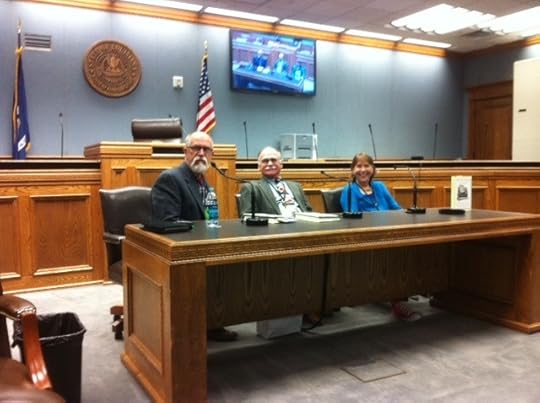
Authors Sonny Brewer, Tim Gautreaux, and Barb Johnson at the Louisiana Book Festival
November 14, 2011
3 Tools for Curation
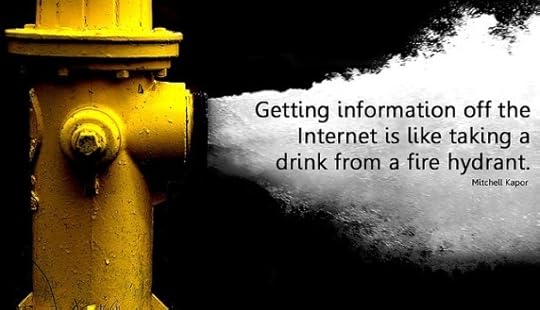
from Flickr / SparkCBC
I love a good curator. I find curation more valuable these days than content.
My latest e-newsletter focused on 3 curation tools. You can view it here. (Subscribe by clicking here.)
I also mention a couple articles related to curation that you should read:
Content Is a Service Business (O'Reilly Radar) by Andrew Savikas
Accessibility vs. Access (Nieman Journalism Lab) by Maria Popova
Any other curation tools you know and love? (Or articles on the topic?) Please share in the comments.
November 13, 2011
What Words of Yours Have Made an Impact?
What single thing have you said that's had the most significant positive impact on another person?
The two biggest themes were:
Declarations of romantic love (marriage proposals & acceptances, e.g., "I do!")
Parents' unconditional love for their children
As far as romantic love goes, Wil Dalphin's answer took the cake:
"Maybe this will make you feel better."
The context of that quote is that my then girlfriend and I had just returned home from Thanksgiving, and she asked me if I wanted to break up with her. Apparently, while we visited my family briefly, my mother pulled her aside and told her that she didn't think I was very serious about my relationship with her, and that she should back off any pressure she was putting on me to commit. I knew nothing of this at the time until we came home and she asked me the question and started crying.
So I went into the bedroom and rifled through my sock drawer, pulling out the ring I'd hidden there and had planned to give her for Christmas. Came back into the living room and handed her the box, saying simply, "Maybe this will make you feel better."
That was basically my marriage proposal.
The most popular responses by far were from parents offering support and encouragement to their children:
Would you like to be a part of our family? (spoken to three young kids seeking a forever family)
—Jo Tuite
I am your mother. Nothing you could do would make me love you less. Go for it!
—Marilyn Slagel
One person—you—can change the world. Said to each of my children.
—Ruth Littner
Sometimes the support and encouragement came in the form of tough love:
#bbpBox_134685784669298688 a { text-decoration:none; color:#FF0000; }#bbpBox_134685784669298688 a:hover { text-decoration:underline; }@November 10, 2011 12:36 pm via Mobile Web Reply Retweet Favorite Adrian Archer
#bbpBox_134684660608417793 a { text-decoration:none; color:#0084B4; }#bbpBox_134684660608417793 a:hover { text-decoration:underline; }@November 10, 2011 12:31 pm via web Reply Retweet Favorite chris kenny
Other answers felt like they could be the opening line of a wonderful novel or personal essay. (Writers, take note.)
It's not your fault.
—Melody Layne
This isn't about you.
—Karen Adams
You can do better than that.
—Pablo Defendini
You need to get your power back.
—Dawn Herring
There's a third possibility. You could wind up being alone.
—Neal Powers
One person, rather than provide an answer, provided an alternative question that might be better than the original:
That is not an easy question. Maybe an easier one is "What single thing has someone said to you to that had the most positive impact?"
—Tammy Servies
So now I open BOTH questions up to you. What do you think?
November 11, 2011
10 Phrases to Purge From Your Speech & Writing
The following is excerpted from Word Savvy by Nancy Ragno, recently released by Writer's Digest Books.
The following mistakes occur so often that they have come to sound and look correct. Undoubtedly, you will recognize some entries as known errors, but others may give you pause: "Is that an error? I didn't realize that."
Since the list is a manageable size, a brief scan will quickly tell you what you need to learn. Show your superior word savvy. Purge the following offenders from your speech and your writing.
1. Alot
Not a word. Instead, use two separate words: a lot. A lot means "a large number or amount; to a great degree or extent."
2. Alright
Not a word. Write it as two words: all right. Because all right is commonly spoken as one word, it is mistakenly written that way. All right means "very well, okay, without a doubt."
CORRECT: After the storm, we checked the property to make sure everything was all right.
3. By the power invested in me
The correct phrase is by the power vested in me. Invested usually refers to financial transactions. Vested means "bestowed on; conferred on."
INCORRECT: By the power invested in me by the State of New Jersey …
CORRECT: By the power vested in me by the State of New Jersey …
4. Could care less
The correct phrase is could not care less or couldn't care less.
INCORRECT: I could care less about ice hockey.
This is illogical. It means that the speaker cares about ice hockey but possibly could care less about it.
CORRECT: I am not at all interested in ice hockey and couldn't care less about it.
5. Could of
The correct expression is could have.
INCORRECT: I could of danced all night!
CORRECT: I could have danced all night.
6. Final ultimatum
This phrase is redundant since ultimatum encompasses the meaning "final." Use ultimatum by itself, without a modifier. Ultimatum means "a final statement of terms; one's last word on a subject."
7. For all intensive purposes
The correct phrase is for all intents and purposes. It means "for all practical purposes; in effect."
CORRECT: These unsold items from our garage sale are, for all intents and purposes, useless.
8. Heart-wrenching
Not a word. It may have originated by mistakenly connecting it to the similar word gut-wrenching. The correct word is heartrending. Heartrending means "inciting anguish, arousing deep sympathy; extremely moving."
CORRECT: The Derby opened with a heartrending rendition of "My Old Kentucky Home."
9. Hone in on
The correct phrase is home in on. It means "to aim at a target" (as a homing pigeon aims at its home). In contrast, to hone means "to sharpen" (as you would hone a blade to sharpen it).
CORRECT: Police are homing in on the robbery suspect.
10. Irregardless
Not a standard word. Instead, use regardless. Regardless means "in spite of; without regard for."
CORRECT: I must have that ring regardless of its cost.
 Interested in finding out more? Word Savvy offers 15 additional no-no's, as well as how to master the 76 commonly confused word pairs, and conquer the 52 commonly misused words. Click here to find out more on Amazon, or visit the website dedicated to the book. Author Nancy Ragno earned her master's at New York University and is a former teacher, lecturer, and textbook author.
Interested in finding out more? Word Savvy offers 15 additional no-no's, as well as how to master the 76 commonly confused word pairs, and conquer the 52 commonly misused words. Click here to find out more on Amazon, or visit the website dedicated to the book. Author Nancy Ragno earned her master's at New York University and is a former teacher, lecturer, and textbook author.
November 10, 2011
Writing on the Ether

Temple at Sounion / Photo: Porter Anderson
One short golden age
Careful. We are a destination for detonation this week, my Ethernaut. That plate is hot, these gases are flammable, and those matches are rattling in the box. Don your tinfoil computing suit. I don't want to have to hose you down.
Here we have mild-mannered author Tobias Buckell:
Imagine my disgust to see the loud-mouthed "if you don't self publish you're an idiot" crowd of Michael Stackpole and Barry Eisler and J.A Konrath (remember, Konrath and Eisler work with Amazon, they don't self publish as such) thumping themselves on the chest and saying 'if you don't self publish you're a house slave.' … Three white dudes, screaming about how it's really *them* being oppressed … how tone deaf. How self involved. How dripping full of loud, male privilege.
He titles that one a demure Self publishing doesn't mean you have to be a raging f–k wad
#bbpBox_134141547443785728 a { text-decoration:none; color:#2FC2EF; }#bbpBox_134141547443785728 a:hover { text-decoration:underline; }@November 9, 2011 12:33 am via TweetDeck Reply Retweet Favorite Barry Eisler
Speaking of Barry Eisler, he's as articulate as all get-out in comments on the new Mike Shatzkin post. This is Eisler:
Personally, I don't think there ever was a time of "pure" indie publishing. After all, Amanda Hocking needed Amazon's, B&N's, and Smashwords' distribution to get her books to readers—she didn't sell through her own website. And even if she had sold through her own website, she would have been reliant on her website hosting company, on PayPal for billing services, etc.
Then there's Kristen Lamb, lone star, fleecing the fuzz to warn us Beware the Social Media Snuggie–One Size Does NOT Fit All:
As awesome as indie presses are, logic dictates that most of them won't have the manpower to help us in promotion and marketing like Random House or Penguin. We don't get book placement in major chain bookstores or Wal-mart or Costco. We need a VERY LARGE PLATFORM. Sure, the indie press will help, but the lion's share of the burden is ours.
Lamb adds, "Pay attention to Chuck Wendig. He makes the second-oldest-profession-in-the-world look good and is not above showing a little leg."
I can't look.
#bbpBox_133585028910297089 a { text-decoration:none; color:#1F98C7; }#bbpBox_133585028910297089 a:hover { text-decoration:underline; }@November 7, 2011 11:42 am via web Reply Retweet Favorite Ginger Clark
The glory that was Greece? Now at fire-sale prices. The grandeur that was Rome? Look out for falling Silvios. Every boy can't be Tom Clancy, and every girl may not make as mean a cheese sandwich as Margaret Atwood.
Novelist and speechwriter Keith Cronin stokes the blaze:
There are many inexperienced writers who are simply using self-publishing as a way to skip the hassle of trying to gain anybody else's editorial approval … I'm not opposed to self-publishing. I'm opposed to shortcuts. And I'm starting to see inexperienced writers choose self-publishing as an alternative to learning to write well, fueled by impatience and dreams of becoming the next Amanda Hocking or John Locke.
Cronin's piece, for Writer Unboxed, is called An Endangered Rite of Passage, and he goes on to write, "So gleeful are they in having eluded the 'evil gatekeepers' that they think it's perfectly fine to self-publish anything they write, brimming with confidence that every word they type is literary gold."
This is a job for Shatzkin:
Publishers are right when they say there's a role for them in an ebook world … Although authors will continue to self-publish, the debate that matters in the future is what the basket of services will be that authors require and what will be the right price for them … good covers, changing covers, dynamic pricing, constantly improved metadata, monitoring to catch glitch take-downs, as well as developmental editing, line-editing, copy-editing, and proofreading … The lines are drawn for that discussion and the opinions are really all over the lot.
Mike Shatzkin, in True "do-it-yourself" publishing success stories will probably become rare, is, among other things, effectively endorsing Jane Friedman's now-prescient Self-Published Authors Have Great Power, But Are They Taking Responsibility? I quoted it here last week. It's roughly summarize-able this way: Don't throw publishing professionalism out with the bubble bath of irrationally exuberant DIY-ism.
Shatzkin, for his part, debriefs traditional- and self-publishing author Bob Mayer. He had Mayer speak at his Publisher's Launch's "eBooks for Everyone Else" (#eBEE) in San Francisco. And Mayer now comes to us with a true veteran's perspective in For authors there are many roads to the Oz of publishing—thoughts from Publishers Launch:
Things have exploded in the argument of traditional publishing versus self-publishing versus agent publishing versus using those little gray guys at Area 51 publish you…The key for a writer is to sort through all the facts, opinions and flat out lies being thrown about, figure out their own situation, decide where they want to be as an author in the future, and then smartly and courageously choose their own path.
What's more, remember, no path can for-sure save you from the mortification of format-failure. Did you see Kassia Krozser's account of what it felt like to read HarperCollins' initial ebook edition of Neal Stephenson's Reamde in That Customer Service Thing?
So I started the book. And I noticed. Oh, I noticed. Conversion errors galore! Okay, maybe five conversion errors in my first half-hour of reading. Anything that jerks me out of the flow of a story—and, boy, do conversion errors do that!—is a Bad Thing.
Whether you're going out as gentle as Lamb's "hybrid author" or roaring in, beating the papyrus yourself, there's a chance your tools of change (generic, not our buddies at TOC) aren't even stabilized yet.
So. As they say in "Camelot," that was one brief shining moment, huh?
Jump into the Comments below and join the conflagration.
Before the blowback hits, I'm going to have Shatzkin airlift us out of here with a practical point from one of his own answers to a comment on his blog:
I didn't suggest that one should abandon self- or indie-publishing for traditional. The point I was making … is that people developing the chops to do this will find it sensible to do it for other authors, and that indie authors will find lots of help from places other than the big publishers … A one-to-one relationship between an author and a publishing machine is inherently inefficient. Even in the digital age.
#bbpBox_134413581184802816 a { text-decoration:none; color:#0084B4; }#bbpBox_134413581184802816 a:hover { text-decoration:underline; }I'm so busy playing with the book cover I forgot about the book. #OCD RT @about 15 hours ago via TweetDeck Reply Retweet Favorite Victoria Mixon
Buckell bucks the trend: a comments-free blog
I turned off the comments to this blog last year, right around this time. I had little energy as I dealt with recovering my health, and I'd come to realize that I was less interested in spending my energy as a moderator and wanted to spend more of it writing and blogging. Some predicted doom. Others knowingly said things like "engagement with readers is critical to growing your brand." … Despite all that, traffic surged as I both increased my blogging here, and also found my voice.
Still understated, Tobias Buckell takes a detailed look at The story of a blog, my blog and comes to some interesting conclusions about a field in which "every other new writer is doing the same thing. Everyone's trying to position themselves as an expert about writing. Or publishing."
#bbpBox_132215085128093696 a { text-decoration:none; color:#706238; }#bbpBox_132215085128093696 a:hover { text-decoration:underline; }I am shocked...SHOCKED ... To learn that AMZN is not playing by publishing's Marquis de Queensbury rules.[image error]November 3, 2011 4:58 pm via Twitter for iPhone Reply Retweet Favorite Don Linn
Deepest, darkest Amazonia
The program is great for Amazon and maybe even for consumers, assuming they're willing to live with the many restrictions, but it's awful for publishers and authors. Why? As Amazon stated in its press release, "For the vast majority of titles, Amazon has reached agreement with publishers to include titles for a fixed fee." So no matter how popular (or unpopular) the publisher's titles are, they get one flat fee for participation in the library. I strongly believe this type of program needs to compensate publishers and authors on a usage level, not a flat fee. The more a title is borrowed, the higher the fee to the publisher and author. Period.
O'Reilly's expert observer Joe Wikert, while a longtime proponent of Amazon, doesn't hesitate to wade right into The problem with Amazon's Kindle Owners' Lending Library.
The agent and author community have not been consulted about this new sort of use of authors' copyrighted material, and are unaware of how publishers plan on compensating authors for this sort of use of their books, which is unprecedented … Without a clear contractual understanding with their authors, it is unclear to us how publishers can participate in this program. We take very seriously our role to protect the interests of our clients, and at this stage it is difficult to see how this program is in the best interests of our clients.
That language, with its important, troubling questions about the Kindle lending initiative is the statement of the Association of Authors' Representatives (AAR, the professional organization for agents). Agent Rachelle Gardner helpfully includes it in her piece on Amazon Kindle Owners' Lending Library. And Mathew Ingram voices the parallel exasperation, in Kindle lending: Book publishers still not getting it:
Here's a hint for publishers: Book prices are going down whether you like it or not, and trying to maintain artificially high prices for electronic books is a losing strategy. In some cases …dropping the price of an e-book can produce sales that are orders of magnitude larger than they otherwise would be. That's clearly a good thing, just as allowing more authors to reach readers via programs like Amazon's lending feature is a good thing. But publishers are still not interested.
And meanwhile, down on the Amazon Publishing farm, David Streitfeld at the Times picks up on Laura Hazard Owen's revealing The Truth About Amazon Publishing and creates a wish list of concerns, almost fascinating in the proverbial train-wreck way. His post is titled Uncovering Amazon Publishing.
Ms. Owen concludes that "Amazon Publishing hasn't killed print yet." But is anyone saying it has? The real question is whether it will reshape publishing by dissolving old rules and creating new expectations, the way it has reconfigured bookselling. Will a physical edition become the reward for a successful electronic publication? Will authors enlarge their share of e-book revenues at the expense of traditional publishers? Will independent bookstores carry Amazon books?
The exquisitely named Alexis Madrigal gets the final (spoken) word in The Atlantic: I See Your Siri and Raise You a Yap: Amazon Quietly Snaps Up Speech-Recognition Startup.
No charge to Prime members for shipping those earplugs.
#bbpBox_134006955437076480 a { text-decoration:none; color:#0084B4; }#bbpBox_134006955437076480 a:hover { text-decoration:underline; }The B&N nook's key advantage? In-person, in-store guidance & support, a la the Apple store. *Very* important for newbies. #toccon[image error]November 8, 2011 3:38 pm via TweetDeck Reply Retweet Favorite Joe Wikert
Still with me? Good. Let's confer on conferring
Since you can't swing a dead cat these days without hitting a conference on publishing it felt worthwhile to share what I hope are constructive suggestions … What's tough in most conferences is pattern-spotting and takeaway extraction. What's missing are the epiphanies a great teacher gets her students to notice by the end of a class or semester: a sense kids get that they now know more about the topic than when they began.
Having wafted a lot about conferences on last week's Ether, I'm glad to come across a fine post that almost got away. It's by Peter Meyers, who spoke, himself, at the fine O'Reilly/Internet Archive Books in Browsers conference. (Here's the video of Meyers' presentation on "The Infinite Canvas" of digital production.)
Meyers came away dissatisfied in ways that many of us might grok. No criticism of #BiB11 is intended or material here. What's at issue is the standard format and effect of so many confabs we're all trundling through, in which, Meyers writes, we all get "Conference head"—that state you're in after "speakers #2, #5, #8, and #11 all talk about how 'social reading' is gonna change digital books" and everybody staggers out of the Whatever Vista Ballroom finding it "hard to pinpoint what, exactly, they've learned."
It's late in the game for folks planning the next Writer's Digest Conference (#wdc12), Digital Book World (#dbw12), Tools of Change (#toccon), and the Chinese mainland of these things, Association of Writers & Writing Programs (#awp12). But I'll bet that even at this point, some sessions, some sequences of events, could be thought through in light of what Meyers is so good at articulating in Presentation Overload: Alternatives to Serial Speaker Syndrome. My favorite of his points:
Boy, for an industry built around authors, it's amazing how little time they get at our events. I'm not just talking about storytellers. I'm also thinking of how-to explainers, idea-weavers, cookbook chefs, photographers. Is there a way to get more of these people up on stage—not just talking about their fears in this new era of publishing—but actually sharing what they create to remind everyone of why consumers buy books in the first place?
#bbpBox_132179433086914561 a { text-decoration:none; color:#000064; }#bbpBox_132179433086914561 a:hover { text-decoration:underline; }There are literally no laptops open at this conference?! Bizarro world? Canada!#rgdDT #notATechConference[image error]November 3, 2011 2:36 pm via Twitter for iPhone Reply Retweet Favorite Craig Mod
Who are you calling a distraction?
Everything I've ever written was composed in notebooks first. I have hundreds of them filled with my scribbles tucked away in boxes … I find that writing longhand I can enter a zone of comfort I find hard to achieve when sitting in front of a screen–I find typing annoying, if I'm honest, not the mechanics of it, but the sound. The constant tap-tap-tap-tap on the keyboard reminds me of all the offices I've worked in.
Author and fellow critic Lee Rourke says "there are far too many distractions when writing directly onto the screen," in Why creative writing is better with a pen. What on Earth is he talking about?
#bbpBox_132196173271412736 a { text-decoration:none; color:#0084B4; }#bbpBox_132196173271412736 a:hover { text-decoration:underline; }there are amalgamators among us #pubwest[image error]November 3, 2011 3:43 pm via TweetDeck Reply Retweet Favorite Brian O'Leary
Big fat books and young wives' tales?
What this means for long-winded authors is hard to judge—will they benefit (and perhaps write even fatter whoppers) because the disincentive of having to lug heavy novels around and rest them on your tummy disappears? Or suffer because readers become more aware of the eye-fatigue associated with ebooks the longer a book continues?
So not only does John Dugdale at the Guardian declare us to be seized by The craze for long books he tells us is going "on and on," but he's announcing an association of eye-fatigue with the reading of long ebooks. No sourcing of that little revelation, you'll note. He just lays it in there with the Trowel of Truth, there ya go, boom, we're done. Somebody call Jeff Bezos.
#bbpBox_134403182263672833 a { text-decoration:none; color:#0018b3; }#bbpBox_134403182263672833 a:hover { text-decoration:underline; }Imagine Desert Island Discs for novels... new series on my red blog. http://t.co/vwsC8BrH[image error]about 16 hours ago via HootSuite Reply Retweet Favorite Roz Morris
Workhouse whistleblower
Night came very suddenly. Dickens's readers needed to fasten their safety belts: it was going to be a bumpy ride. He was intent on deromanticising the criminal world, of which he had such vivid firsthand experience in his endless nocturnal wanderings through the city.
I'm loving Simon Callow's essay on Dickens in his time and what Oliver Twist meant, in conjunction with the Guardian's competition with Vintage Classics to create cover art for An Oliver Twist for Our Times, a forthcoming, new edition for 2012. When Dickens will have been 200 years old.
#bbpBox_131855438340833282 a { text-decoration:none; color:#009999; }#bbpBox_131855438340833282 a:hover { text-decoration:underline; }@November 2, 2011 5:09 pm via Twitter for iPhone Reply Retweet Favorite Pablo Defendini
Comics with a Kick(starter)
Mainstream comics are a buck more expensive and have two pages less content; there are still (riddle me this, Batman!) a majority of female editors but almost no women writers or artists on mainstream books. The writing of female, LGBTQ and minority characters is still kinda cringemaking as they're still mainly penned by straight white guys … but … but … now there's Kickstarter. And now there's digital self-publishing, without having to front up a crapload of money to pay a printer.
Alex de Campi, Comics Innovator and Provocateur, talks with Guy LeCharles Gonzalez about her Ashes Kickstarter fundraiser: "I'm a writer, not a coder."
#bbpBox_134108442129473537 a { text-decoration:none; color:#0084B4; }#bbpBox_134108442129473537 a:hover { text-decoration:underline; }!!! Ashes is $32 away from breaking the $12k barrier, and not far off 50%. Anyone? http://t.co/G7J0Zzpv[image error]November 8, 2011 10:21 pm via web Reply Retweet Favorite alexdecampi
What's rational and what's rationalizing in piracy?
If there were NO way to get these products without paying, and these people weren't habituated to "free," wouldn't we have avoided creating a whole generation of people who feel entitled to intellectual property without paying for it? In any case, plenty of freeloaders can afford to purchase books/movies/songs. They just choose not to.
Agent Rachelle Gardner responds to blog-reader questions on the topic in Authors and Book Piracy
#bbpBox_132959663082835968 a { text-decoration:none; color:#0084B4; }#bbpBox_132959663082835968 a:hover { text-decoration:underline; }How do you get to Carnegie Hall? Xanax, Xanax, Xanax. #badwithcrowds[image error]November 5, 2011 6:17 pm via Twitter for iPhone Reply Retweet Favorite Olivia M. Giovetti
May all your panics be creative
The amateur (i.e., me blundering around Tel Aviv or getting stuck for twenty minutes in a parking garage) identifies his momentary panic with himself; he internalizes it, blames himself, and loses his composure, making an uncomfortable situation far worse than it needs to be. The professional (i.e., this famous aviator in his Mirage fighter plane with the engine flaming out) does NOT identify with the fear he's feeling; he focuses instead on the problem—and solves it.
Steve Pressfield, my favorite Warrior of Art, would think he looked pretty professional trying to get his Hertz out of a garage overseas if he'd seen me trying to get one into the Dusseldorf airport after buzzing over from Maastricht at the crack of dawn. And as our good friend Todd Henry comments when Steve announces he's Out of My Comfort Zone, "I love the observation that creative panic rarely means smoke in the cockpit."
Since it seems we're all driving through one creative panic or another this week, I'm handing the wheel back to the maestro here:
Comfort zones do widen. What scared us on Tuesday becomes old hat by Friday. Composure can be learned. I'll remind myself of that, tomorrow at Minute Nineteen, when I'm still trying to find my way out of the parking garage.
Porter Anderson is a Fellow with the National Critics Institute, and a producer and consultant formerly with the United Nations World Food Programme in Rome and INDEX: Design to Improve Life in Copenhagen. As a journalist, he has worked with media including CNN, the Village Voice, and the Dallas Times Herald. He reviews literary fiction at Reader Unboxed, and is based in Tampa.
November 9, 2011
When to Modify Your Name Due to SEO Concerns

I received the following question from Jan O'Hara:
I have a dilemma to sort out about author names. These are the issues:
1. Depending upon the blogging platform I'm using, it variously codes my name as OHara, O'Hara, O\Hara, or Hara.
2. Twitter does not recognize apostrophes. To cope, I'm using the handle @jan_ohara. In essence, I'm training my Twitter followers to use the wrong search criteria. This wouldn't necessarily be a problem except for these next two points.
3. While some search engines or bookselling sites prompt the reader to find the correct spelling, this is not consistent. I cannot be guaranteed a reader who searches for "ohara" will be sent on to "O'Hara."
4. I've checked search results within Google, Yahoo, Amazon, and Goodreads for published authors who use names with apostrophes. There's a vast difference in the quantity and quality of data that emerge for "O'Name" versus "Oname." In some cases, the latter misses out on more than 50% of the search information. (For example, a search under John Oname yields half the results of John O'Name, and the John Oname page will not necessarily prompt the reader to look for the correct spelling.)
In other words, as online searchability and metadata become ever more crucial, I think I've given myself a handicap. Do you agree? In your opinion, is this a sufficiently big enough reason to change my online name?
If you agree it's an issue, when should I make the change? (While soonest seems best, I'm concerned about the probability of making a shift now, then regretting it if/when a publisher dislikes my choice. This has happened to several authors I know.)
Any tips on the mechanics of change, other than purchasing my domain name and spreading out from there? Is it better to make the leap and change everything, or call oneself "Jan O'Hara, writing under the name _____" ?
Thanks for any and all help you're able to provide!
First, I do think you're right to be thinking about this issue. Online search is becoming critical for discoverability of all media. It's not a stretch to say that if people can't find you via Google, you don't exist. Every author should anticipate what keywords their readers will use when running a search, and pay attention to what results come up with those search terms. Are you easy to find or does someone have to really dig?
Well, let's use you as an example to get started! Here's what happened when I looked for you on Google. On the top, I searched for "Jan O'Hara." On the bottom, I searched for "Jan OHara."
In both instances, I'm getting the same results. Also, when I omit the apostrophe from your name, Google automatically attempts to correct the spelling. This is exactly what you want—as you've noted above.
I probably don't have to tell you that whatever Google does should be your guiding star. Even if various blog platforms, Twitter, or other social networking sites don't use the apostrophe, or don't prompt for one, I don't think it's anywhere near as important as what the No. 1 search engine does. Why? Because people least familiar with you will likely start with Google. And you catch more fish with that net because most people start a search that way.
If you went to the trouble to change your name due to search/discoverability concerns, I believe there'd need to be a far more serious impediment, such as:
Someone else who is very established—whether a celebrity or well-known author—has the exact same name as you. (This usually means that you don't have the online domain names or handles associated with the celebrity name, which is a disadvantage and annoyance.)
You have a very common name that makes it next to impossible for someone to search for you specifically.
Your name is exceptionally difficult to pronounce, spell, or otherwise remember for search purposes.
Even if you fell into one of these categories, there are ways to alleviate the problem—and reasons why it may not be as bad as you think.
People may remember your book title along with your name, which greatly narrows results.
If you have a moniker, e.g., "The Writer Mama," that can also help direct people to the right place. In your case, it's "Tartitude"!
Often people will find you through a referral, rather than a direct search.
On this last point, I'll illustrate by showing you where my site traffic comes from:
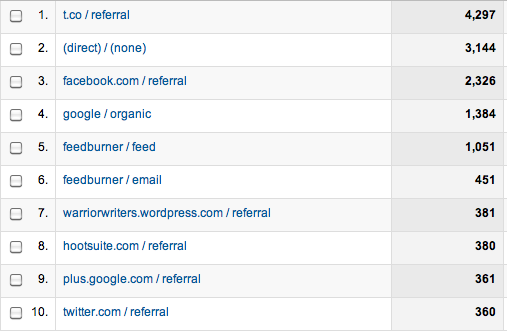
As you can see, the bulk of my traffic comes from social networks, primarily Twitter (that's the t.co referral at the top). About 10% of my traffic currently comes from organic search.
Anyone who's concerned about whether they're being easily found via search should check their Google Analytics to see what keywords are bringing people to the site. Here's a snapshot of mine:
The No. 1 keyword bringing people to my site are those searching for "Jane Friedman." It helps that my domain is, in fact, JaneFriedman.com.
A few final tips:
If you don't already own a domain name, choose one that will be relevant over the course of your career, beyond any specific project or book. Hopefully the domain you buy is similar to your name, but if that's not possible, it's not the end of the world. Your site has all kinds of metadata associated with it that will be indexed by Google and tie it to the name you specify. That's why Jan's blog, Tartitude, comes up first in Google search results, even though her name is not in the URL or in the official blog name.
Claim your Facebook vanity URL. Instructions here.
No matter what name you choose, be as consistent as possible across all social networks and profiles. (Don't use your real name in one place, then switch to Cupcake87 on the next one.) Don't make people guess what name you'll be going by next!
Be very clear on your website, and all social networks, where else you are active or might be found. Cross-linking and promoting is not annoying; it's a service to those who'd like to connect with you on other sites.
So, Jan: I don't think you need to change a thing at this point. Your presence is consistent and solid.
But I'd like to open up this issue to all of you! Please share your advice and your experiences—either good or bad—in figuring out what your "official" author name is and how you optimize it for search. Are there secrets or warnings you have that I've missed? I know I haven't covered it all! Do jump in.
November 8, 2011
How to Hire the Right Website Designer
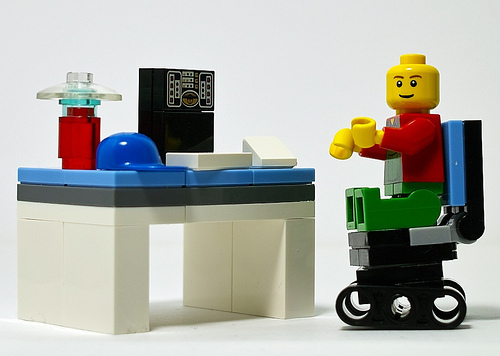
by slackware / Flickr
Today's guest post is by Eliana Berlfein, a website designer based in Boulder, Colorado.
A website is a big investment in your career as an author, and often the most visible aspect of your platform. While you might be able to handle it on your own, many authors find it worthwhile to hire design help that's reliable and competent. But you also want someone who is just right for you.
Defining "website designer"
There are primarily two parts to building a website. There's the design part and the technical or development part. The design part usually includes designing the look and feel, the layout, and the navigational structure. The technical part involves code to turn the design into a website. Sometimes the design and development overlap. So the term website designer can be confusing.
Sometimes the designer is referred to as the website designer, while the technical person is referred to as the website developer. But often "website designer" refers to one person who does both. That's how we'll use the term in the following questions.
These questions will help you determine if your potential web designer is right for you. The questions assume you are talking to an individual rather than an agency. If you are interviewing a team of people, the questions may vary.
1. How long have you been designing websites?
If someone has been creating websites for awhile, there's a good chance that they will be around for the long haul. Being in business a long time is not enough to prove they're competent and reliable, but it's a start.
2. Can I see your portfolio?
Looking at someone's portfolio can provide you with a lot of information. You should be looking for a few things.
Do you like their design style? It's important that you like their style, because the design they do for you will probably have a similar style.
Do their sites function well?
Are their sites easy to get around? Is there a lot of clutter, or is it clear how to find what you're looking for?
3. Are you primarily a designer, programmer, or both?
Some people can create a beautiful design as well as expertly code your site. But most people excel at one or the other. In some cases, you only need one set of skills. Make sure your web designer has whatever skills are needed to get the job done right.
4. Can we meet and talk (virtually or in person)?
Creating a website is a joint effort between you and the designer. You will be having a lot of conversations over the course of the project, and it's important that you can communicate well with each other and that you are comfortable with their communication style. The only way to get a sense of that is to have a conversation.
5. Will we sign a contract?
Verbal agreements are not enough. You should receive written documentation that spells out the scope of the project. You should know exactly what you're getting and how much it's going to cost. This protects both you and the web designer, and is essential for preventing misunderstandings. If the designer is billing by the hour, you should be given an estimate along with some agreement as to what happens if the process takes longer than the estimate.
6. How are website updates handled?
It used to be that you had to hire your website designer to update your site for even the smallest changes, unless it was built with an expensive proprietary content management system. A content management system, or CMS, allows you to update your site without knowing any code or programming languages. These days there are a number of free systems that nearly anyone can use without special knowledge, such as WordPress, Joomla, and Drupal. Of these systems, WordPress is the easiest to use. If you want to update your site yourself, ask your website designer if they use WordPress or another content management system.
7. Who owns my site after it's completed and paid for?
You should have full ownership of your website. Make sure you get all of your login information so that if somewhere down the line your website designer is no longer in business, you have access to your site.
Some companies build their websites with proprietary software. This may work well while you are hosted with them, but you will not be able to move your site anywhere else, since it needs the proprietary software to run.
WordPress is a very popular platform, so I recommend using it if at all possible. If you want to move your site or change website designers, you'll have no trouble finding someone else who can take over.
 Eliana Berlfein of Sidewalk Cafe Design is a website designer in Boulder, Colorado. Her focus is on building websites for authors that will increase their visibility, help build their platform and increase their book sales. Eliana has been designing and developing websites since 1997. Her mission is to make the Internet a more beautiful place by creating stunning websites. Want more tips on how to hire the right designer? Visit Eliana's site and request her informational download.
Eliana Berlfein of Sidewalk Cafe Design is a website designer in Boulder, Colorado. Her focus is on building websites for authors that will increase their visibility, help build their platform and increase their book sales. Eliana has been designing and developing websites since 1997. Her mission is to make the Internet a more beautiful place by creating stunning websites. Want more tips on how to hire the right designer? Visit Eliana's site and request her informational download.
Jane Friedman
- Jane Friedman's profile
- 1882 followers


